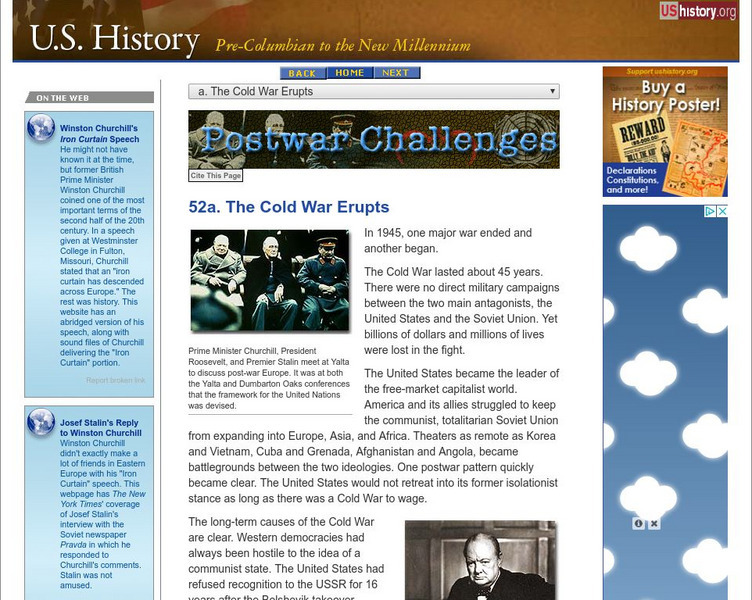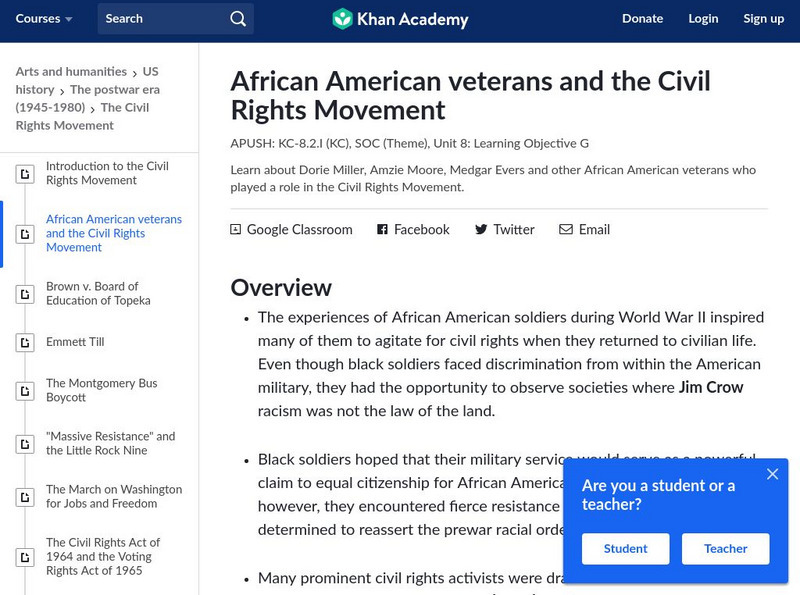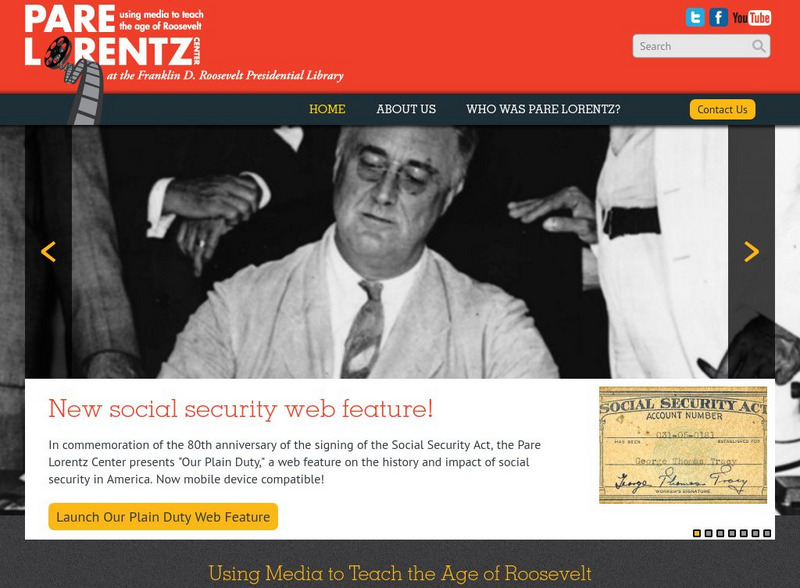PBS
Wnet: Thirteen: Freedom: A History of Us: Twentieth Century Monsters
PBS provides a detailed overview of America's involvement in World War II and the political movements lead by evil dictators that were sprouting up in countries such as Germany, Spain, Italy, and Japan.
PBS
Pbs Learning Media: Writing in u.s. History: Shaping the Postwar World
Consider how U.S. foreign policy changed in the aftermath of WWII, and analyze the philosophical, geopolitical, and economic factors that influenced these changes. In this interactive lesson from WGBH, students develop a written argument...
A&E Television
History.com: Black Heroes Throughout Us Military History
Meet the standout soldiers, spies and homefront forces who fought for America, from the Revolution to World War II. During the American Revolution, thousands of Black Americans fought -- on both sides of the conflict. As America's Civil...
Smithsonian Institution
National Museum of American History: The Price of Freedom: Americans at War
View comprehensive sets of artifacts that tell the story of America's wartime past and present. Artifacts from every major American military conflict, beginning with the American Revolution, can be closely examined. Full curatorial notes...
Digital History
Digital History: The Decision to Drop the Bomb [Pdf]
The day before the bombing of Pearl Harbor, President Franklin Roosevelt gave the go-ahead to scientists to develop an atomic bomb. This site gives a good overview of the war in the Pacific against Japan, the increasing successes of the...
Raleigh Charter High School
Mrs. Newmark's Page: World War Ii Chronology 2
This assessment has you put events of WWII on the European front in chronological order.
OpenStax
Open Stax: Fighting the Good Fight in Wwii 1941 1945: Victory in European Theater
Examines the diplomatic negotiations among the Big Three leaders - Roosevelt, Churchill and Stalin - during World War II. Discusses the invasion of North Africa, the invasion of Europe, the shock of seeing the impact of the Holocaust...
Independence Hall Association
U.s. History: The Cold War Erupts
World War II ended in 1945 and the Cold War began immediately. Read about the mistrust Western Europe and the United States felt towards the Soviet Union and Joseph Stalin. Learn how the Soviets expanded their realm of influence and...
Independence Hall Association
U.s. History: War in the Pacific
The war in the Pacific raged throughout World War II. Read about the Japanese early successes, and see how the American troops recaptured and moved closer to Japan at the end of the war.
Independence Hall Association
U.s. History: War Breaks Out
A brief look at the expansionist moves of Japan in China, including a description of the Rape of Nanking. Also read about the military expansionism in Europe and Africa by both Germany and Italy, finally resulting in a declaration of war...
Raleigh Charter High School
Mrs. Newmark's Page: March to War
Take this quiz to assess your knowledge on World War II history.
Other
The History Net
The History Net is a leading portal for history enthusiasts, researchers, educators, and students. Extensive content can be found on almost any topic. Use "site search" to quickly find what you are looking for.
US Army Center
U.s. Army Center of Military History: The Framework of Hemisphere Defense
This is the first chapter of a book on military history. It describes how the United States developed its policy of hemispheric defense between 1938 and 1941. The policy was designed to protect the Western Hemisphere from attack by...
Khan Academy
Khan Academy: Pearl Harbor
Describes the surprise attack on Pearl Harbor by Japan, an event that catapulted the United States into World War II.
Khan Academy
Khan Academy: The Baby Boom
Looks at the baby boom in America after World War II - what caused it, why it lasted so long, and the far-reaching social and economic impact it has had on the United States.
Khan Academy
Khan Academy: The Gi Bill
The GI Bill is explained. It provided benefits to American veterans of World War II in the form of education, loans, unemployment income, etc.
Khan Academy
Khan Academy: African American Veterans and the Civil Rights Movement
Many African American veterans joined the Civil Rights Movement after World War II when they found themselves facing continued discrimination at home. Learn about some of the veterans who were prominent activists.
Library of Congress
Loc: Veterans History Project
A collection, sponsored by the Library of Congress, of stories and experiences of veterans "while they are still among us." Students can also interview a veteran using the Project Kit supplied. Choose: How to participate in the Project...
Khan Academy
Khan Academy: Ap Us History: 1890 1945: The Us in Wwi: The Treaty of Versailles
Looks at the Treaty of Versailles, what its terms were, why America never ratified it or joined the League of Nations, why Germans grew to resent the burdens it imposed on them, and how this contributed to Hitler's rise to power....
Khan Academy
Khan Academy: Start of Cold War, Part 1: Yalta Conference and Containment
At the end of World War II, the Yalta Conference saw the splitting of Germany into four zones and the United States began a policy of containment of communism.
Curated OER
National Park Service: Eisenhower National Historic Site: Military Career
Online exhibition details aspects of Eisenhower's military career, beginning with his days as a West Point cadet. Covers his campaigns in North Africa and Italy, his appointment as Supreme Allied Commander, the Normandy invasion, and his...
US Navy
Nhhc: Oceanic Period (1890 1945)
Read about the build-up of the U.S. Navy after the Spanish-American War and how it was used to protech the country in World Wars I and II.
Other
Pare Lorentz Film Center
A media source for information on the life and times of Franklin D. Roosevelt. The film center is named after Pare Lorentz, a renowned documentary filmmaker who created government-sponsored films during Roosevelt's era, as well as...
Independence Hall Association
U.s. History: The Treaty of Versailles and the League of Nations
President Wilson lobbied for a "just peace" for the end of World War I. Read about his Fourteen Points that he thought would accomplish this. See how his plans for a League of Nations and the final terms of the Treaty of Versailles...
















